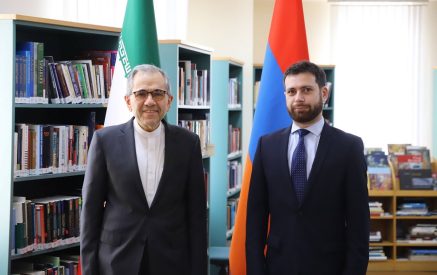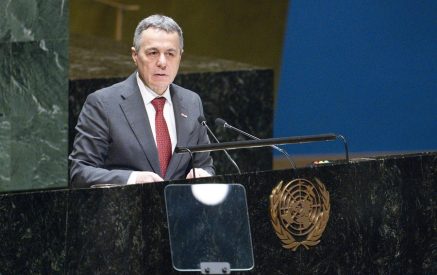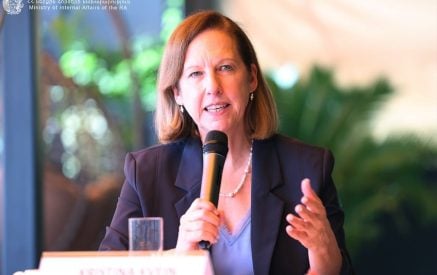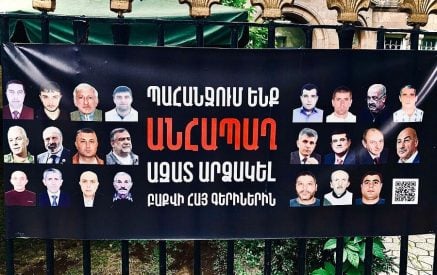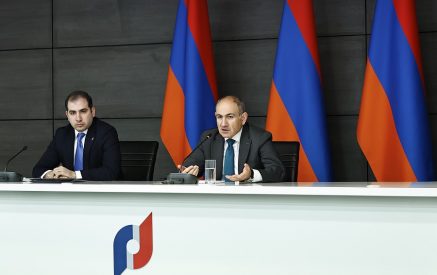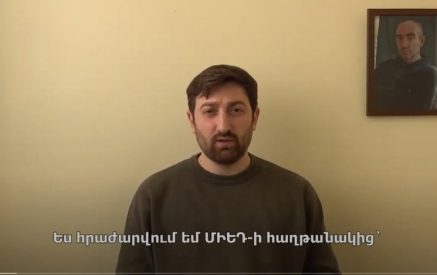Annual report for 2023 on the implementation of ECHR rulings – key figures
The European Court of Human Rights delivers judgments and sends them to the Committee of Ministers of the Council of Europe which supervises the process of execution of these judgments by member States of the Council of Europe, based on submissions from the applicants, state authorities, NGOs and other information. The report covers the period until 31/12/2023.
2023 Annual Report , press release: Annual report on the implementation of ECHR rulings: Significant progress, but important challenges remain
Read also
* Figures concerning the Russian Federation, which is no longer a member of the Council of Europe, have been separated from those related to member states for the first time in this year’s report. They are not included into the general tables and statistics.
Armenia
In 2023, the Committee of Ministers received from the European Court 28 cases against Armenia for supervision of their execution (compared to 19 in 2022 and 22 in 2021).
On 31 December 2023, Armenia had 70 cases pending execution (compared to 57 in 2022 and 50 in 2021), of which six were leading cases classified under enhanced procedure (as was the case in 2022 and compared to five in 2021), and 20 were leading cases classified under standard procedure. Of the leading cases under enhanced procedure, five have been pending for five years or more; similarly, six of the leading cases under standard procedure have been pending for five years or more (compared to five in 2022 and four in 2021).16 The pending caseload includes notably cases concerning freedom of assembly, police ill-treatment and inadequate healthcare in prisons. Of the new violations found by the Court in 2023, one of them concerned the lack of access to court for a dismissed judge.
In the course of 2023, the Committee of Ministers examined and adopted decisions in respect of four leading cases or groups of cases under enhanced procedure. The Committee closed 15 cases, including one leading case under standard supervision. In addition, 10 repetitive cases were closed because no further individual measures were necessary or possible.
The authorities submitted 11 action plans, five action reports and eight communications.
An updated action plan/action report containing additional information was awaited in one case, in which the deadline set by the Committee of Ministers in this respect has expired, and in another case in which feedback was sent by the Department for Execution of Judgments before 1 January 2023.
Finally, full payment of the just satisfaction awarded by the Court was registered in 24 cases in 2023, while confirmation of full payment and/or default interest was awaited in one case for which the deadline indicated in the Court’s judgment has passed since more than six months.
- Of these cases, three leading cases under standard procedure were pending for more than 10 years.
New cases (new judgments delivered by the Court and sent to the Committee of Ministers for supervision of execution)
- There was another slight decrease in new judgments delivered by the Court and forwarded to the Committee for supervision in 2023 (1,043, compared to 1,046 in 2022) following a significant rise (from 765 to 1,112 cases) between 2020 and 2021 [p112]
- Of the 1,043 new cases forwarded to the Committee in 2023, 174 (16.7%) were “leading” cases, requiring specific and often wide-ranging measures to be taken by states to prevent the same violations happening again, and 869 (83.3%) were repetitive cases [p112]
- The countries with the highest total number of new cases in 2023 were:
- Ukraine = 125
- Italy, Romania = 87
- Azerbaijan = 84
- Türkiye = 78
- Serbia = 76
For ARMENIA, 28 new judgments were delivered by the European Court in 2023, and these cases were subsequently sent to the Committee of Ministers to supervise how Armenia will implement them.
The countries with the highest number of new leading cases in 2023 were:
- Türkiye = 15
- Romania = 13
- Poland = 12
- Bulgaria, Greece, Italy = 8
- Albania, Hungary, Republic of Moldova, Spain, Ukraine = 7 [p114-116]
For ARMENIA, there were 22 new repetitive cases, and 6 new leading cases (requiring specific and often wide-ranging measures to be taken by states to prevent the same violations happening again) for Armenia in 2023. In 2022, there were 19 new cases (13 repetitive and 6 leading).
Pending cases
Pending cases are those in which the execution process is ongoing. As a consequence, pending cases are at various stages of execution and must not be understood as unexecuted cases. In the overwhelming majority of these cases, individual redress has been provided, and cases remain pending mainly awaiting implementation of general measures, some of which are very complex, requiring considerable time.
- There were 3,819 cases pending at the end of 2023, compared to 3,760 at the end of 2022 – an increase of 1.57%; of the 3,819 cases pending at the end of 2023, 1,088 (28.5%) were leading cases and 2,731 (71.5%) were repetitive [p117]
- The countries with the highest total number of pending cases at the end of 2023 were:
- Ukraine = 766
- Romania = 476
- Türkiye = 446
- Azerbaijan = 337
- Italy= 249 [p119-121]
- The countries with the highest number of leading cases pending at the end of 2023 were:
- Türkiye = 124
- Romania = 115
- Ukraine = 103
- Bulgaria = 89
- Italy = 66 [p119-121]
For ARMENIA, the total number of cases pending execution by the end of 2023 was 70 (as compared to 57 in 2022). Out of them, 42 were repetitive, and 28 leading cases (as compared to 34 and 23 in 2022, respectively).
Length of the execution process
- Of the 1,088 leading cases pending at the end of 2023, 500 (46.0%) had been pending for more than 5 years [p122]
- The countries with the highest number of leading cases pending for more than 5 years at the end of 2023 were:
- Türkiye = 72
- Ukraine = 69
- Romania = 53
- Bulgaria = 51
- Italy = 33 [p123-4]
For ARMENIA, 11 leading cases have been pending for more than 5 years.
Closed cases
- A total of 982 cases were closed in 2023, following the adoption of measures to implement ECHR judgments, compared to 877 cases closed in 2022 – an increase of 12.0% [p127]
- Of the 982 cases closed in 2023, 180 (18.3%) were leading cases and 802 (81.7%) were repetitive cases [p127]
- The countries with the highest total number of closed cases in 2023 were:
- Hungary = 123
- Romania = 121
- Türkiye = 111
- Serbia = 96
- Ukraine = 75
- The countries with the highest number of leading cases closed in 2023 were:
- Türkiye = 21
- Bulgaria = 14
- Poland, Romania = 12
- Ukraine = 10
- France = 9 [p129-131]
For ARMENIA, 15 cases were closed, as compared to 12 in 2022.
Respect of payment deadlines
This part concerns the payment by the state to the applicants of the ‘just satisfaction’ awarded by the European Court in its judgments.
- Of the 996 payments of “just satisfaction” made by member states in 2023, as a result of ECHR rulings, 696 (69.9%%) were made within deadline and 300 (30.1%) outside deadline
- The Committee was awaiting confirmation of payment of ‘just satisfaction’ in 1,128 cases at the end of 2023; in 690 of those cases (61.2%), the Committee had been awaiting confirmation of payment for more than 6 months after the payment deadline [p137]
- The countries concerning which the Committee was awaiting confirmation of payment in the most cases at the end of 2023 were:
- Ukraine = 384 cases
- Romania = 176 cases
- Italy = 136 cases
- Azerbaijan = 89 cases
- Türkiye = 70 cases [p137-8]
For ARMENIA, by the end of 2023, confirmation of payment was awaited in 4 cases. In 24 cases, payments were made within deadline in 2023.





